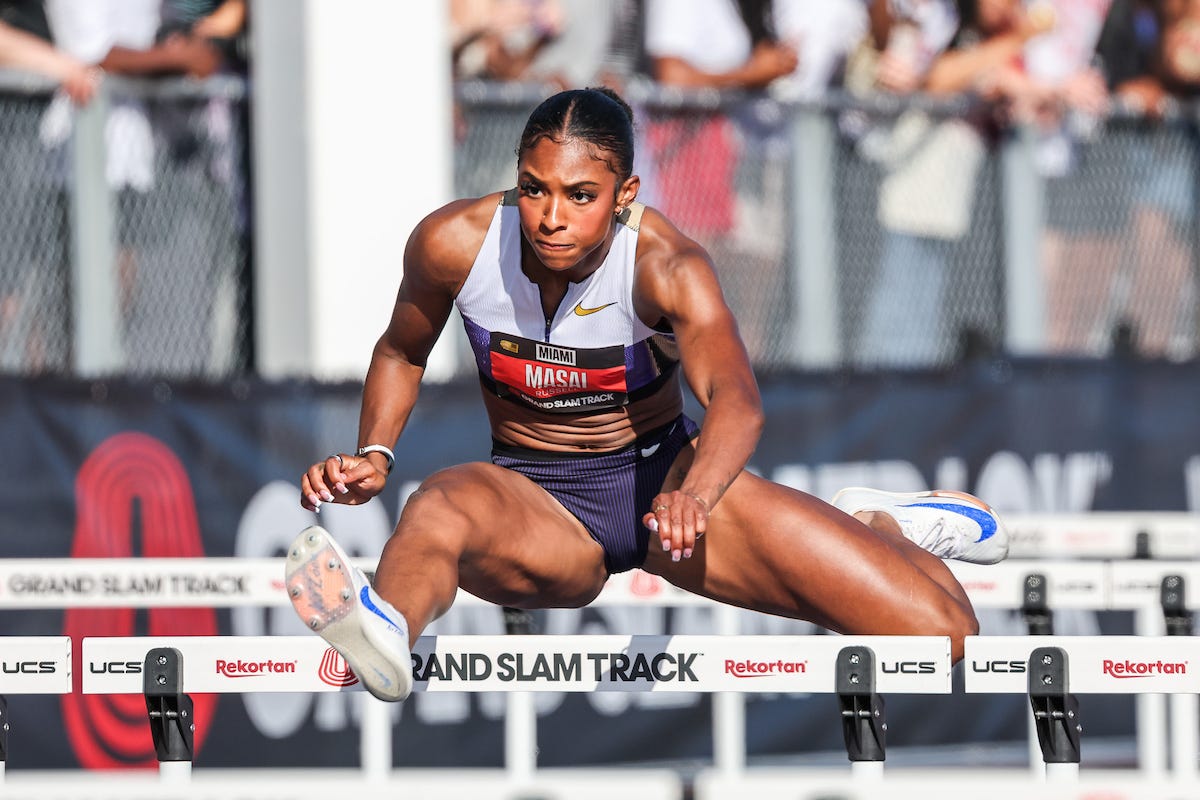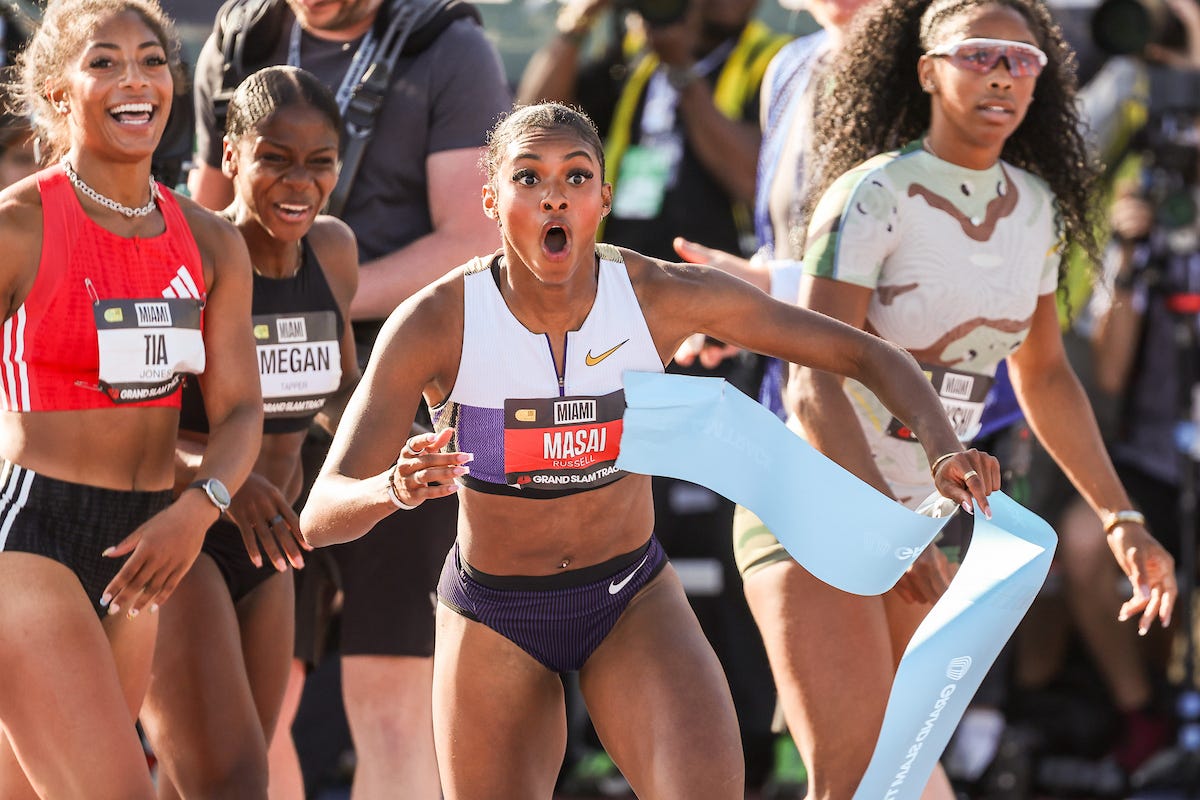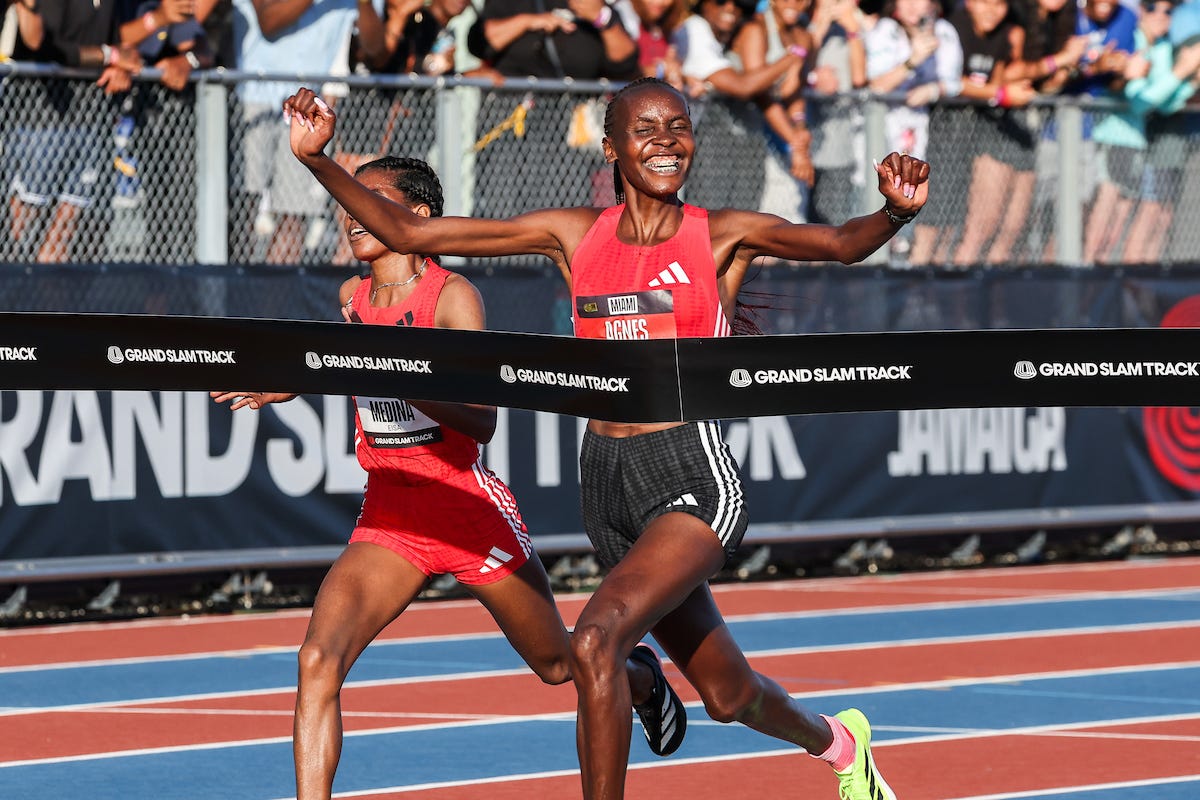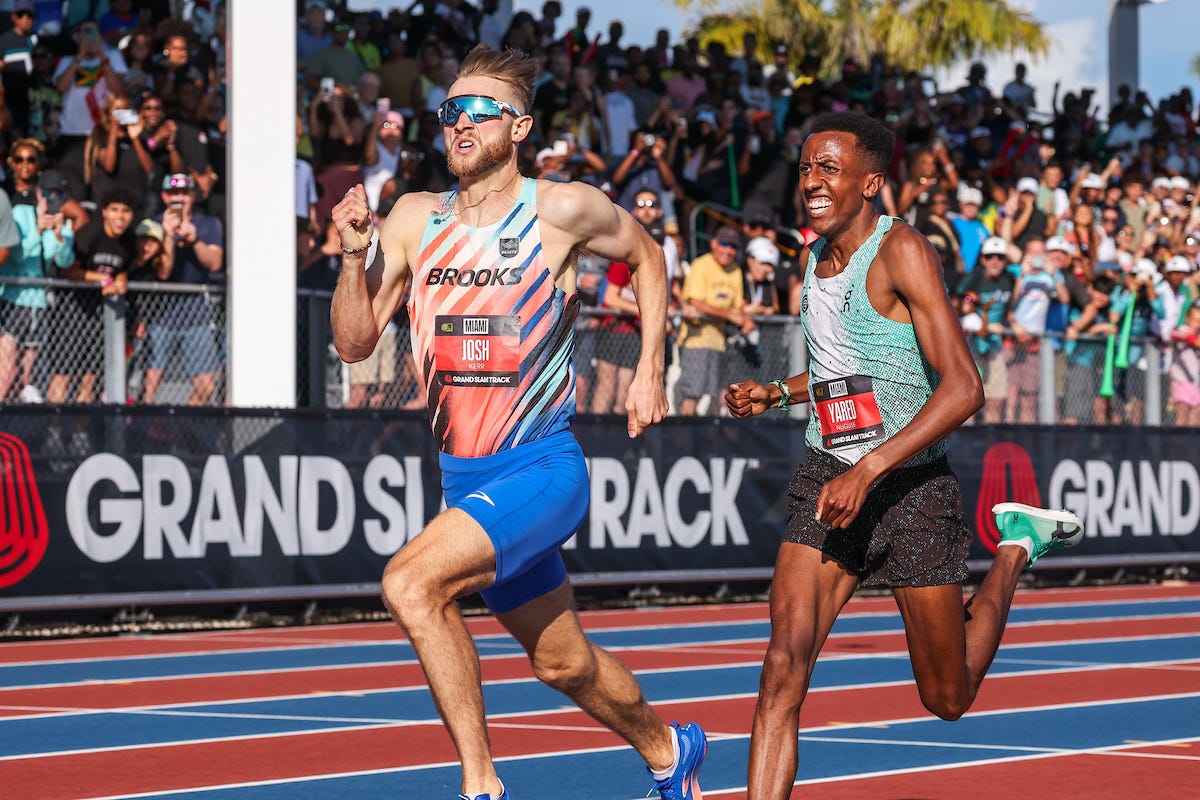Russell bounces back with a vengeance
Olympic champion sets U.S. record in 100 hurdles in Grand Slam Track meet

Three weeks and six days after beginning her outdoor track season in the women’s 100-meter hurdles with a thud, Masai Russell set a U.S. record of 12.17 seconds in winning the event on the first day of the second Grand Slam Track meet of the season in Miramar, Florida.
Running on a fast track with a nice — but legal — tailwind behind her, the 24-year-old Russell ran down fast-starting compatriot Tia Jones during the second half of the race to slash eight hundredths of a second off her personal best of 12.25 and better the U.S. record of 12.20 that had been a world record when Keni Harrison recorded it in 2016.
The time moved Russell from a tie for fifth to second on the all-time performer list behind Nigerian Tobi Amusan, who had run 12.12 in a semifinal of the 2022 World Athletics Championships in Eugene, Oregon.
Jones ran the third-fastest time in history with her 12.19 clocking, an effort that crushed her previous best of 12.38 that she had set in 2022. Jones was followed by Ackera Nugent of Jamaica in 12.34, Harrison in 12.40, Megan Tapper of Jamaica in 12.50, and Alaysha Johnson of the U.S. in 12.56.
“I don’t even know what to say, these girls bring the best out of me every time," Russell said in an afp.com post.
Russell’s previous best had come when she won the final of last year’s U.S. Olympic Team Trials and she had clocked 12.33 in a come-from-behind victory in the Olympic Games in Paris. But she had run a disappointing 12.78 to finish fifth in the inaugural Grand Slam Track meet in Kingston, Jamaica, on April 5 before running 12.65 to finish second in the Tom Jones Memorial Invitational two weeks later and 12.74 to win the Drake Relays last Saturday.
She and Jones embraced afterward and there was no doubt that the latter had played a part in the former’s national-record performance at the Ansin Sport Complex. For Jones, who won the first Grand Slam Track race in 12.63, got off to one of her typically quick starts while running in lane one.
She had a solid lead after the first five hurdles of the race, but Russell, running in lane four, began to make up ground on her at the sixth of 10 barriers and she was basically even with Jones coming off the ninth hurdle and had the smallest of leads as she touched down off the tenth.
She and Jones were both understandably excited when they saw the results flash on the trackside video board, and Russell became even more animated when the wind reading was verified at 2.0 meters per second, the maximum allowable for record purposes.
Although Russell won all three of her races in the 60-meter hurdles during a undercover season in which she ran a personal best of 7.74 in winning the USA Track & Field Indoor Championships in February, it is still very early in the outdoor campaign. The USATF Outdoor Championships do not start until July 31 and the World championships will be held in Tokyo from Sept. 13-21.
However, Russell is a hurdler on the rise as she produced her fastest series of races in the Olympic Trials and the Olympic Games last year during her first full season as a professional.

While Russell and Jones had the top two performances in the meet that included eight races on Friday, yearly world-leading marks were also produced in the men’s 200 meters and the women’s 5,000. In addition, the women’s 100 saw two performers run under 10.80 in a wind-aided race in which the tailwind was 2.4 meters per second.
The men’s 200, which was part of the long sprints event category, and the women’s 5,000, which was part of the long distance division, actually produced the two fastest times in the world this year in each event.
Jereem Richards of Trinidad and Tobago, who placed fourth in the 400 in the Olympic Games, won the 200 by the narrowest of margins as he and Alexander Ogando of the Dominican Republic were each credited with a time of 19.86.
Muzala Samukanga of Zambia, the Olympic bronze medalist in the 400, placed third in a personal best of 20.23 and he was followed by 2021 Olympic 400 champion Steven Gardiner of the Bahamas in 20.37.
Ogando, who tied his national record with his effort, had the lead coming off the turn, but Richards was able to catch just before the finish line.
Richards’ time was his fastest since he ran a personal best of 19.80 in 2022 and it let him know that he had recovered fully from an illness that led to him producing disappointing times of 45.35 in the 400 and 20.81 in the 200 in the first Grand Slam Track meet.
“I knew I was in shape,” Richards said in a trackside interview. “I just had to get better. And it took a while.”
Richards added that his confidence had received a boost last Saturday when he ran 10.25 in winning a section of the 100 in the PURE Athletics Invitational in Clermont, Florida.
“It showed me that the speed is there. You know, sometimes when you don’t perform the way you want to perform, you doubt yourself. I had a little bit of doubt. That 100 showed me that I had the speed.”
Kenyan Agnes Ngetich completed a very productive seven-day period for her when she won the women’s 5,000 in a personal best and yearly world-leading time of 14:25.80 after setting a women’s-only world record of 29:27 in the road 10,000-meter event in the Adizero Road to Records meet in Herzogenaurach, Germany, last Saturday.
Ngetich is not known for having a great kick so she forced the pace from an early point in the 5,000 in an effort to break away from 20-year-old Ethiopian Medina Eisa, who had won her third consecutive title in the 5k run in the meet in Herzogenaurach.
With that in mind, she led the field through the first kilometer in 2:54.15 and the second in 5:42.95
She and Eisa were well clear of the rest of the eight-runner field after the first 2,000 meters and Ngetich then went through 3,000 meters in 8:38.30 and 4,000 in 11:32.91.
There were a few times during the race when Ngetich motioned for Eisa to help with the pacesetting duties, but the Ethiopian was content to run a stride or two behind her.
She did move up to Ngetich’s shoulder going around the final turn before swinging out into lane two entering the home straightaway. But she was never to overtake the taller Kenyan who broke into a huge smile a couple of strides before she crossed the finish line in 14:25.80 after running her final kilometer in 2:49.89.
Eisa placed second in 14:25.92 and she was followed by Hirut Meshesha of Ethiopia in 14:40.46 and Janeth Chepngetich of Kenya in 14:46.16.
“It was not easy, because Eisa is an athlete,” Ngetich said of her victory. “I tried to kick, and I was like, ‘Let me try today to kick.’ ”

Americans Melissa Jefferson-Wooden and Tamari Davis were the two women who ran under 10.80 in the 100.
Jefferson, the bronze medalist in the Olympic Games, got off to a good start and she never let up as her 10.75 clocking was the fastest in the world this year under any conditions and Davis’ 10.79 was the second fastest.
Favour Ofili of Nigeria finished third in 10.94 and she was followed by Olympic 200 champion Gabby Thomas in 10.97 and Jacious Sears in 10.98.
Jefferson-Wooden said after the race that, “This year, I’m focusing on what I can do, leaning on the people around me who know what I’m capable of, and now it’s my turn to show that to the world.”
The other event winners on Friday were Olympic champion Marileidy Paulino of the Dominican Republic in the women’s 400, Josh Kerr of Great Britain in the men’s 1,500, Alison dos Santos of Brazil in the men’s 400 intermediate hurdles, and Andrew Coscoran of Ireland in the men’s 3,000.
Paulino had finished third in the 400 behind Salwa Eid Naser of Bahrain and Thomas in the inaugural Grand Slam Track meet when Eid Naser ran a yearly world-leading time of 48.67. But Paulino overtook Eid Naser in the final 40 meters of the rematch when she clocked a season best of 49.21 to Eid Naser’s 49.33.
Alexis Holmes of the U.S. placed third in 50.36, followed by compatriot Isabella Whittaker in 50.38 and Nickisha Pryce of Jamaica in 50.71.
Kerr, the 2023 World champion and Olympic silver medalist, won the men’s 1,500 in 3:34.52 after overtaking Olympic bronze medalist Yared Nuguse of the U.S. in the final 50 meters of the race.
Nuguse finished second in 3:34.65 and he was followed by compatriot and Olympic champion Cole Hocker in 3:34.79, Kethobogile Haingura of Botswana in a personal best of 3:35.21, and Peter Bol of Australia in 3:35.24.
Nuguse had taken the lead after the first 300 meters of the race, but the pace he set was not fast enough to drop anyone in the eight-runner field.
Hocker and Kerr were in second and forth place when Nuguse went through 800 meters in 1:58.03 and they were still in those positions when Nuguse reached the 1,100-meter mark in 2:41.07. Olympic 800 silver medalist Marco Arop of Canada had taken the lead at the end of three laps in 2:55.04 and he was still right in the thick of things entering the home straightaway before he finished seventh in a personal best of 3:35.95.
It was an emotional victory for Kerr as his indoor season never materialized after an illness knocked him out of the Millrose Games in February. He had then finished a disappointing fifth in the 1,500 and eighth in the 800 in the inaugural Grand Slam Track meet.
“I was just trying to hold on as much as I could and close as hard as I could,” he said. “There’s a lot of emotion behind that finish… I want to get back to my best. And, you know, this is a step towards that.”

Dos Santos, a two-time Olympic bronze medalist in the intermediate hurdles, won that event in 47.97 on Friday after having run a yearly world-leading time of 47.61 in the meet in Kingston.
Caleb Dean of the U.S. had a small lead over dos Santos after the seventh flight of hurdles, but he hit the eighth hurdle hard and clobbered the 10th while on his way to a fifth-place finish in 49.90.
Meanwhile, dos Santos ran a controlled race over the final three barriers while finishing nearly a second in front of Christopher Robinson of the U.S., who placed second in 48.92.
He was followed by Malik James-King of Jamaica in 49.43 and Trevor Bassitt of the U.S. in 49.49.
Coscoran outkicked Grant Fisher of the U.S. and George Mills of Great Britain to win an incredibly slow 3,000 in 8:17.56.
Mills had the lead coming off the final turn, but he was eventually passed by Fisher, the world indoor record-holder in the 3,000 and 5,000. And then Coscoran overtook both of them, edging past Fisher in the final strides of the race.
Fisher finished second in 8:17.60, followed by Mills in 8:17.77 and Cooper Teare of the U.S. in 8:18.08.
The times were so slow that announcer Steve Cram, a former world-record holder in the 1,500 meters and mile for Great Britain, said that the victorious Coscoran shouldn’t “even look at the time because it’s embarrassing.”
The second day of the meet will start today at 5:42 p.m., Eastern Daylight Time, with the running of the women’s 400 hurdles, an event that will feature Sydney McLaughlin-Levrone of the U.S., the two-time defending Olympic champion and an athlete who has set six world records.
Peacock’s coverage of the meet will begin at 5 p.m.



